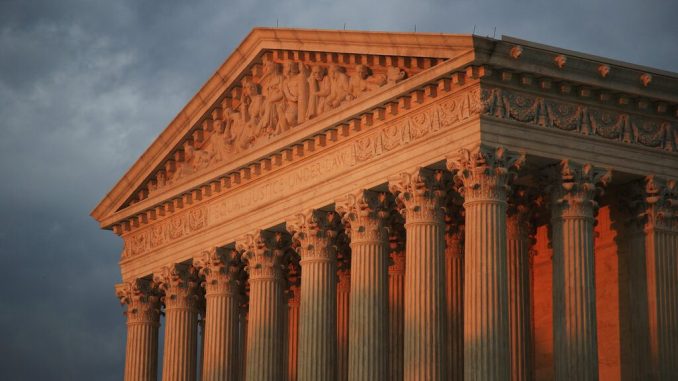

FILE – This Oct. 4, 2018, file photo shows the U.S. Supreme Court at sunset in Washington. (AP Photo/Manuel Balce Ceneta, File)
OAN NEWSROOM
UPDATED 10:54 AM PT – Friday, July 1, 2022
The Supreme Court issued its final ruling of the term, wrapping up a historic session packed with several prominent rulings. In a five to four decision Thursday, the nation’s highest court ruled the Biden administration can terminate the Trump-era Remain in Mexico policy. The high court found the administration’s push to end the policy did not violate federal immigration law.
Justices John Roberts and Brett Kavanaugh sided with the court’s liberal justices in the ruling. The policy, first enacted in 2019, required asylum seekers to stay in Mexico while their claims were processed in court. Thursday’s decision now paves the way for Biden to go through with ending the policy. Texas Governor Greg Abbott (R) has called on the Biden administration to reinstate Trump-era policies, while asserting they have proved to be effective.
“Building a border wall, keeping in place both Title 42 and the Remain in Mexico policy and enforcing those,” Abbott stated. “So, those policies remain in effect right now. However, it is my understanding that the way we see it, Biden is not enforcing those. Ending catch and release. Those are the four things that are very simple to do.”
Earlier, the Supreme Court sided with Joseph Kennedy, a former high school football coach in Washington State, who was let go for publicly praying on the field after games. In the court’s opinion, Justice Neil Gorsuch explained that both the free exercise and free speech clauses of the First Amendment protect expressions like Mr. Kennedy’s.
“It’s not for the Christians or the Jews, or the atheists or whoever,” said Kennedy. “It is for all Americans and that’s why I thought this was such a huge win. It’s more a freedom of speech thing for me personally because it was just a moment between me and God. It had nothing to do with anybody else.”
Additionally, the Supreme Court issued a ruling limiting the federal government’s authority to regulate greenhouse gas emissions from power plants. In a six-to-three decision, the court ruled the EPA cannot pass sweeping carbon dioxide emissions regulations without congressional approval. This is a victory for West Virginia and a number of other GOP-led states that challenged the EPA while arguing the Clean Air Act did not give the agency power to impose such broad regulations.
The ruling could have far reaching ramifications as it may curb the Biden administrations capability to promote green energy through regulations on carbon dioxide emissions. West Virginia Attorney General Patrick Morrisey responded to the Supreme Courts decision and thanked all the states that were part of the process.
Alos, the Supreme Court welcomed Justice Ketanji Brown Jackson Thursday as she was sworn in as the first black woman to serve on the nations highest court. Supreme Court Justice Stephen Breyer officially stepped down from the bench after a 28-year career. Jackson is slated to participate in arguments for the first time during the court’s next term beginning in October.

